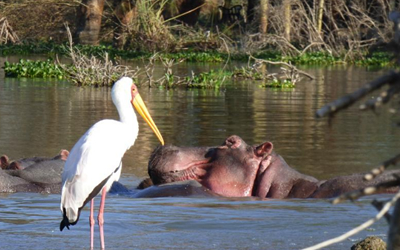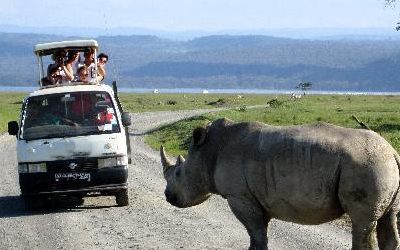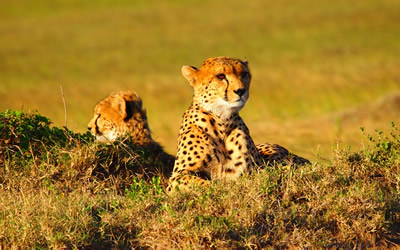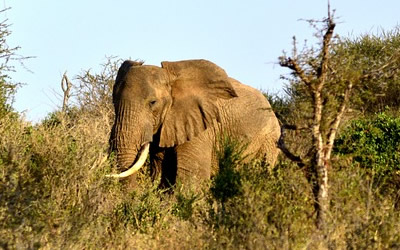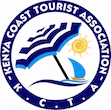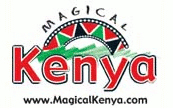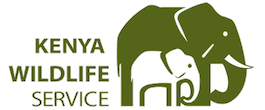VISAS
Kenya Visa: All travelers to Kenya must have current passports valid for 60 days after the expected departure date from Africa. A visa is required and costs $51 and a Transit visa costs $21. The visa can be obtained through a Kenya embassy in advance of your trip or upon arrival at the airport or online at http://www.evisa.go.ke
Tanzania Visa : A visa is required and costs $50 and for a US passport holder, the cost is $100. The visa must be obtained in advance of your trip or if you are doing a Kenya Tanzania safari, you can obtain your visa at the border (It takes only about 5 minutes)
ROADS :
Kenya Roads : All major roads are tarmarced. The surface of lesser roads usually vary. Many roads within the National Parks and reserves are rough and bumpy, though are still quite navigable.
Tanzania Roads : Most of the highways are tarmarced. Road conditions in reserves and parks are rough and bumpy though very navigable.
TIME DIFFERENCE :
Daylight Time.
Kenya Time: GMT +3 hours
Tanzania Time: GMT +3 hours
CREDIT CARDS :
Credit cards Kenya: Most major credit cards (MasterCard, Visa and American Express) are widely accepted. Diner's Card is not generally accepted.
Credit cards Tanzania: Most top hotels and lodges around the country accept Visa and MasterCard. In addition to credit cards, clients are advised to bring US dollars/Euros/ English Sterling Pounds.
HEALTH :
Vaccination requirements change from time to time. Tanzania requires advance inoculations for yellow fever (and certificates thereof) that are valid. Africa Unike Tours and Safaris will advise you on these.
We suggest you consult your local doctor or health department for information on malaria prophylactics and the latest health precautions. If you are on prescription medication, please ensure you have an adequate supply to last the duration of your stay and a copy of your prescription(s). However, Camps and Lodges usually have mosquito nets.
SAFARI ACCOMMODATION :
Each of the Safari packages have carefully chosen hotels, camps and lodges which add to the flavor and romance of your program. They are comfortable and relatively luxurious. On safari we will encounter a variety of accommodation options.
Luxury lodges blend nicely with the landscape and have rooms with all amenities you would expect from a good hotel, such as private rooms with hot running water, toilet and shower. Tented camps are on permanent foundations and have en-suite bathrooms.
The amenities can include hot water bottles to warm your bed before you turn in. Swimming pools are available in most safari camps and lodges.
WATER :
Avoid drinking water straight from the tap. Complimentary bottled water will be provided in the safari Jeep Land Cruiser for all safaris.
Sodas, beer and other beverages can be purchased at the lodges and camps throughout the safari as they have bars and comfortable lounges with fire places for those cool evenings.
BAGGAGE :
While in international flights you can carry any amount luggage you need, our local light aircraft flights in Kenya limit the baggage allowance to a maximum of 33 pounds (15 Kilos), including camera and video equipment.
Any additional luggage can be stored at the hotel in Nairobi until your return. Luggage and personal effects are at owner's risk throughout the tour. Baggage insurance is recommended.
CAMERA EQUIPMENT :
The recommended camera for a safari is a 300mm or longer with automatic exposure and interchangeable lenses or any at your disposal. For the best results in photographing wildlife (including birds), you should have a zoom lens. Remember to bring extra batteries for every camera and flash unit.
CLIMATE :
Kenya and Tanzania are year-round destination with delightful temperatures and plenty of sunshine. Although East Africa is on the equator, only on the coast is the weather tropical. Most safaris are at moderate altitudes where the days are warm and the evenings cool. The humidity is low and daytime temperatures range from 70 to 80 degrees Fahrenheit. Except at the highest elevations, it rarely drops below 50 degrees at night. July and August are the coolest months, with highs in the 70's. The warmest months are December to March with highs in the 80's. The principal rains occur for approximately three weeks during April. Shorter rains usually take place in late October and early November. Travel is possible during the rains. Because you will be near the equator and at an altitude of several thousand feet above sea level, it is easy to sunburn very quickly. It is wise to limit your exposure to the sun or also carry a sunscreen lotion or cream.
SAFARI CLOTHING :
Travelers should bring very casual summer clothes that are easily laundered and dry quickly. Visitors on safari have traditionally worn olive, tan or other neutral colors. These clothes reflect the heat, dont show the inevitable safari dust, and do not stand out when you are trying to look inconspicuous on a game drive. With cool temperatures in the early morning and evening, layering is the best approach. Laundry service is available in most places so you can replenish your supply of clean clothing, as you need it. Much of the time on safari is spent in a Jeep Land Cruiser so lightweight and comfortable walking shoes are appropriate. Hiking boots are not necessary. The style in Africa is casual, even in the evening. Smart casual dressing may be required in some of the hotels at dinner time. Don't forget to pack a swimsuit and cover-up, as most of the properties have lovely pools.
CURRENCY:KENYA
In Kenya, the unit of currency is Kenya Shilling. We recommend that you exchange money only as needed. You will find it easiest to make small purchases in local currencies, and will usually receive a better price. You may conveniently exchange money at all lodges and hotels at close to the bank rate, but the best exchange rates you get from "Bureau de Change".
DRIVER / GUIDE:
Your Driver/Guide will be an integral part of your safari experience.
He will spend many days with you revealing the wonders of Kenya's geography, history and of course their wildlife. Each guide is a local, steeped in the traditions and folklore of his country as well as exceptionally knowledgeable in areas such as local flora and fauna, tribal lore and regional geography.
ELECTRICITY:
The voltage is 220 - 240 as in Europe; however, the plugs are different than those in North America or most parts of Europe. As outlets may vary, we suggest you travel with a variety of international adapter plugs as well as a voltage converter, which may be purchased as a set. The most commonly used adapter plug has 3 square prongs.
It is important to note that lodges in the game parks may turn off their generators during the day and late at night, meaning that no electricity is available. Plan ahead to recharge your phones, gadgets, and video camera batteries at applicable times of the day, or carry extra batteries.
FEES & TAXES:
The land portion of the safari includes government taxes and service charges relating to accommodations and meals provided, entrance fees to national parks and game reserves, and game ranger services (where obligatory).
GAME TROPHIES :
In Kenya, it is illegal to sell any product made from wild animals, including hides and skins, rhinoceros horn, elephant-hair bracelets, crocodile handbags, etc. Please note also that ivory is not legally sold in Kenya. Please note, however, that it is illegal to bring into the U.S. anything made from elephant, rhino or crocodile.
SAFARI GRATUITIES :
It is customary at the end of the program for each individual to tip the Driver/Guide. The sum is usually contingent upon your evaluation of the quality of the service rendered. The amount is at your discretion, You are welcome to provide additional compensation to any staff who have provided special services.
TRAVEL INSURANCE :
Travelers should have medical insurance, as they will be responsible for all medical expenses they may incur.
LANGUAGES :
Both English and Swahili are the official languages in East Africa, and most people you meet will speak English. You may wish to learn and use a few phrases in Swahili.
MEDICAL FACILITIES :
Nairobi has excellent medical facilities. Most camps and lodges have a doctor on call who is experienced with common travel related ailments. We suggest that you make certain your health insurance has adequate coverage, as once you are returned to Nairobi any further medical expenses will need to be covered by you.
SAFETY:
Guests should exercise the same common sense as one would in their country. Normal care and sensible precautions should be taken. Please do not leave cash, jewellery or travellers cheques and portable gadgets unattended in hotel rooms. Every lodge or hotel has a safe deposit facility for your valuables. As a precautionary measure, do not wear flashy jewellery, or leave handbags and photographic equipment unattended in public places.
SAFARI SHOPPING:
Attractive, inexpensive baskets, copper jewellery, batik cloth, beads, carvings, Kenya coffee and tea are all for sale in the shops and markets of Nairobi. Boutiques sell fine art and handicrafts, gemstones and jewellery, including a locally mined semiprecious stone called tanzanite.
Most popular are items carved from wood, which range from small trinkets such as animal head salad spoons and letter openers, to world-class ebony sculpture. Carved soapstone from napkin rings and candlesticks to complete chess sets, are also attractive. Bags woven from sisal and baobab are available in myriad colors, sizes, styles and shapes much more artistic and unique than those reaching the US Market.
East African artisans have responded to the increasing appreciation of tribal artifacts with a variety of stunning original pieces and faithful reproductions: drums, headrests, stools, shields, and beaded necklaces and belts from various parts of the region. Some of the most prized pieces feature elaborately worked silver, malachite and amber beads.
We suggest that you take all goods you purchase with you as shipping and duty cost may easily exceed the cost of the item. When purchasing large pieces, if you must have the items shipped, please note that freight can run into many hundreds of dollars.
SAFARI TRANSPORTATION:
As much of the journey is long hours on the trail on wildlife, the quality of the ground vehicle is of the utmost importance. Each comfortable safari Jeep Land Cruiser carries 5-7, thus affording everyone a window seat and access to the roof hatch. Our safari Driver/Guides are all experienced mechanics.

